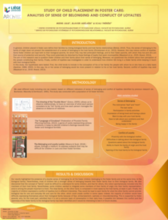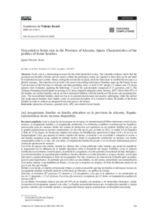Displaying 831 - 840 of 2221
This paper considers the importance of material objects for looked after and adopted children integrated as part of life story work practices.
This study examined the possible differences in educational level by comparing Finnish national register data for 814 former reform school (RS) residents in four cohorts (placed in out-of-home care in 1991, 1996, 2001 and 2006) to 4021 of their peers in the general population matched by gender, age, and place of birth.
The present study uses the US National Youth in Transition Database (NYTD) to examine educational attainment, employment, homelessness, and incarceration for white, African-American, Hispanic, and American Indian/Alaska Native emancipated youth.
This chapter from Former Foster Youth in Postsecondary Education focuses on the transition point when youth begin to age out of care and may move into postsecondary education.
This chapter will help the reader to understand the design and outcomes of the foster care system in the USA.
This poster, presented at the Annual Meeting of the Belgian Association for Psychological Sciences, provides an overview of a study on foster children's sense of belonging.
This article describes what type of families make up the Family Foster Care resource of the Province of Alicante and their parenting styles.
The aim of this study is to discover how the different factors documented at the time of the custody decision or the placement in out-of-home care are associated with the coping abilities of young adults once aftercare services come to an end.
This review aimed to identify, appraise and synthesise published literature concerned with the reunification of looked after children with their birth parents in the UK.
In this study, the authors surveyed one hundred 4- to 11-year-olds removed from home because of maltreatment about their placement preferences. These results suggest that young children may express more mature preferences than recognized by the law, and that there may be value in asking even relatively young children about with whom they would like to live following removal from home as a result of maltreatment.


